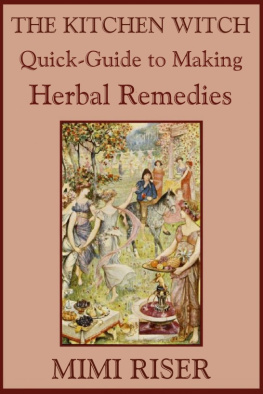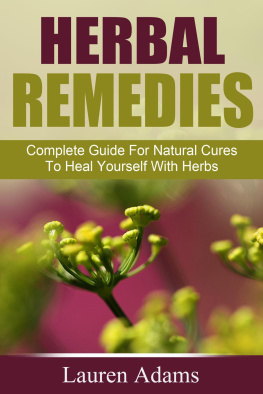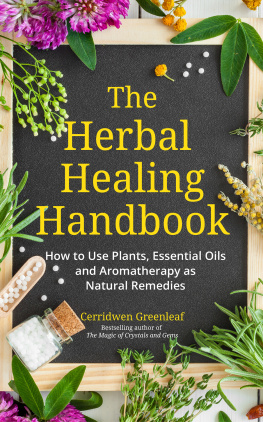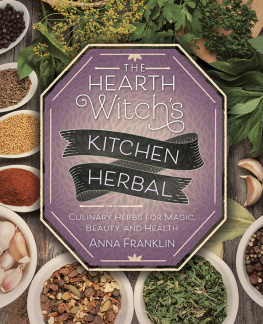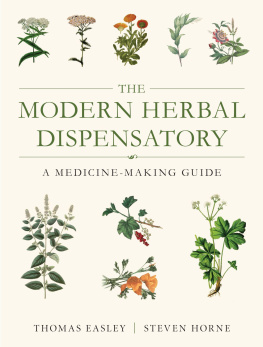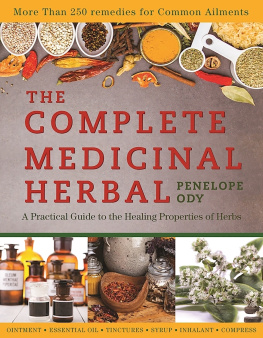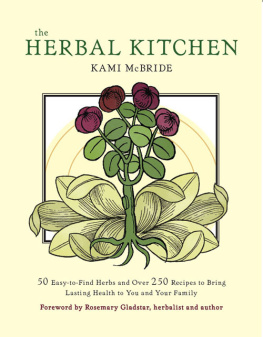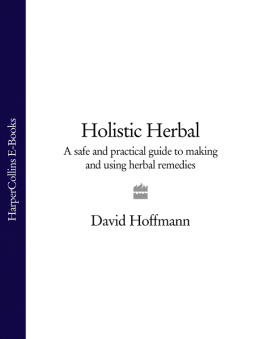Mimi Riser - The Kitchen Witch Quick-Guide to Making Herbal Remedies
Here you can read online Mimi Riser - The Kitchen Witch Quick-Guide to Making Herbal Remedies full text of the book (entire story) in english for free. Download pdf and epub, get meaning, cover and reviews about this ebook. year: 2016, publisher: Mimi Riser, genre: Home and family. Description of the work, (preface) as well as reviews are available. Best literature library LitArk.com created for fans of good reading and offers a wide selection of genres:
Romance novel
Science fiction
Adventure
Detective
Science
History
Home and family
Prose
Art
Politics
Computer
Non-fiction
Religion
Business
Children
Humor
Choose a favorite category and find really read worthwhile books. Enjoy immersion in the world of imagination, feel the emotions of the characters or learn something new for yourself, make an fascinating discovery.
- Book:The Kitchen Witch Quick-Guide to Making Herbal Remedies
- Author:
- Publisher:Mimi Riser
- Genre:
- Year:2016
- Rating:5 / 5
- Favourites:Add to favourites
- Your mark:
- 100
- 1
- 2
- 3
- 4
- 5
The Kitchen Witch Quick-Guide to Making Herbal Remedies: summary, description and annotation
We offer to read an annotation, description, summary or preface (depends on what the author of the book "The Kitchen Witch Quick-Guide to Making Herbal Remedies" wrote himself). If you haven't found the necessary information about the book — write in the comments, we will try to find it.
The Kitchen Witch Quick-Guide to Making Herbal Remedies — read online for free the complete book (whole text) full work
Below is the text of the book, divided by pages. System saving the place of the last page read, allows you to conveniently read the book "The Kitchen Witch Quick-Guide to Making Herbal Remedies" online for free, without having to search again every time where you left off. Put a bookmark, and you can go to the page where you finished reading at any time.
Font size:
Interval:
Bookmark:
<>*<>*<>
www.mimiriser.com
The Kitchen Witch Collection
Copyright 2015 by Mimi Riser
All rights reserved.
Smashwords Edition, Smashwords License Notes:This ebook is licensed for your personal enjoyment only. This ebookmay not be re-sold or given away to other people. If you would liketo share this book with another person, please purchase anadditional copy for each recipient. If youre reading this book anddid not purchase it, or it was not purchased for your use only,then please return to Smashwords.com and purchase your own copy.Thank you for respecting the hard work of this author.
[Disclaimer: All the information in this bookis offered primarily for reference and education. It is notintended to be a substitute for the advice of a licensedhealth-care practitioner. Since the actual use of herbs, therapies,etc. by others is beyond the authors and publishers control, noexpressed or implied guarantee as to their effects can be given,nor liability taken.]
<>*<>*<>*<>
A man may esteem himself happy when thatwhich is his food is also his medicine.
~Henry David Thoreau
The Lord hath created medicines out ofthe earth: and he that is wise will not abhor them.
~Ecclesiasticus 38:4-5
Chapter 1
The first rule of working with herbs is tonever use any plant unless youre certain you know exactly what itis. This is especially true for herbs harvested from the wild. Somepoisonous plants can easily be mistaken for safe ones; and even ifidentified correctly, theres the danger they might have beenexposed to something toxic, such as pesticides or exhaust fumes.Your safest bet with herbs is to either grow them yourself or buythem from a reputable dealer. Many can be found at your localsupermarket. Others are available from health food stores, farmersmarkets, or via mail order.
Also, be aware that any herb, just like anyother kind of medication, could possibly cause an allergic reactionin someone who was sensitive to it. The same herb may workdifferently on different people, and may even work differently onthe same person at different times. How effective any remedy isdepends on the individual metabolism of the one taking it, theirage, weight, environment, general diet and lifestyle, etc.
That being said, herbs were mankinds firstmedicines. Theyve been used successfully for thousands of years,and modern herbalists still consider them better than chemicaldrugs. Granted, at least a third of todays commercially producedpharmaceuticals contain substances extracted from plants (or thesynthesized version thereof), but theres good reason to believethat using the whole natural plant is safer and more effective thanjust its isolated active ingredient. For instance, according tolab tests done in Germany, Saint Johnswort, the entire herb, killsthe AIDS virus in the test tube, while its isolated activeingredient, hypericum, does not.
The fact is medicinal plants usually containmultiple active ingredients, all working together in synergisticharmony. Besides which, the natural plant is just that natural.As such, the body recognizes and metabolizes herbal medications asfood, organic nourishment thats in tune with our ownphysical composition; whereas chemical drugs are inert materialsthat may be incompatible with the bodys chemistry.
Herbal medicines are easy to prepare and use,and many of the ingredients may be in your kitchen right now. Thisguide lists the properties of sixty readily available healing herbsand spices. It includes simple instructions for making herbalpreparations, plus sample recipes and a glossary.
Chapter 2
Basic Preparations
TEAS, also calledTisanes : Herbal teas are brewed either by infusion(steeping) or decoction (simmering). The infusion method is usedwhen you want to extract a plants vitamins and volatileingredients; the relatively short exposure to heat minimizes theirloss. The decoction method, which takes longer, pulls out themineral salts and bitter principles of an herb. Most flower andleaf teas are brewed by infusion, while hard plant materials (suchas roots, bark and seeds) are usually decocted. A medicinal herbcan be used singly or blended with others.
As a general rule, use 1-3 teaspoons (total)of dried herb/s for every cup of water, and steep 5-10 minutes foran infusion, or simmer 10-20 minutes for a decoction. Enameled orstainless steel pots are okay for heating tea water, but never useiron or aluminum (for that matter, its a safe practice to avoidaluminum for any kind of cooking).
Medicinal herb teas are usually taken over aperiod of time in small regular doses, ranging from a mouthful to acupful, the cumulative daily dose generally being from 1-4 cups(depending upon the severity of the ailment and the potency of theremedy). Doses for children, weak or elderly people are usuallyone-third to two-thirds of the average adult dose.
Many herbal teas can also be used as soothingand antiseptic topical washes for bruises, sores, rashes, etc. Forexternal use, brew the tea stronger than you would fordrinking.
------
COLD EXTRACT : Goodfor preserving the most volatile plant ingredients while extractingonly minor amounts of mineral salts and bitter principles.
Put double the amount of herb/s that youwould use for an infusion into a nonmetallic container with asnuggly fitting lid. Add cold spring water or distilled water, andlet the mixture stand for 8-12 hours, gently shaking itoccasionally. Strain before using.
------
TINCTURE : Theadvantage of a tincture is its longevity. Most herbal preparationsare perishable and should be used within a few hours to a few days.But because its made with alcohol, a tincture can lastindefinitely. To create one, blend 1-4 parts powdered herb(depending on the plants potency) with 8-12 parts alcohol, thenlet the mixture stand for 2 weeks, shaking it 1-2 times a day.Strain the finished product through a coffee filter into a cleandark glass bottle with a tight cap.
You can use either rubbing alcohol or vodka,depending upon whether youre making a tincture for external orinternal use. Rubbing alcohol is only for external preparations.Vodka works for both internal and external applications. Eitherway, herbal tinctures are powerful concentrates, so use themsparingly!
------
HERBAL VINEGAR :Since vinegar is a natural disinfectant, another way of preservingherbs is in a 50/50 solution of vinegar and water. Use white,cider, or wine vinegar and distilled water, and 2 tablespoons ofdried herb for every 1 cup of liquid.
Heat the vinegar-water blend in a glass,enamel, or stainless steel pot. As soon as it comes to a boilremove it from the heat and stir in the herb. Cover the pot and letit sit for 8 hours or overnight, then strain the liquid into aclean, tightly capped bottle. Stored in the fridge it can last forweeks.
Herb vinegars make a refreshing body-splashor healing bath additive (the vinegar helps restore the skinsnatural PH balance that soaps can remove). They also makeantiseptic washes for sores and such; and can be used as a garglefor sore throat by stirring a spoonful into a small glass of warmwater.
------
LOZENGES &SYRUPS : To make your own cough drops, simmer 3/4 cup ofherb/s with 1 cup of water in a covered pot for 20 minutes. Letcool, then strain, pressing out all the juice. Mix the decoctedliquid with 2 cups of sugar and 2 tablespoons of corn syrup, andboil the blend (stirring constantly) until the syrup reaches thehard-crack stage (300-310 degrees F. on a candy thermometer). Pourthe syrup onto a buttered baking sheet. When it starts to cool andfirm, score it with a knife and break it into lozenge-sizepieces.
Next pageFont size:
Interval:
Bookmark:
Similar books «The Kitchen Witch Quick-Guide to Making Herbal Remedies»
Look at similar books to The Kitchen Witch Quick-Guide to Making Herbal Remedies. We have selected literature similar in name and meaning in the hope of providing readers with more options to find new, interesting, not yet read works.
Discussion, reviews of the book The Kitchen Witch Quick-Guide to Making Herbal Remedies and just readers' own opinions. Leave your comments, write what you think about the work, its meaning or the main characters. Specify what exactly you liked and what you didn't like, and why you think so.

